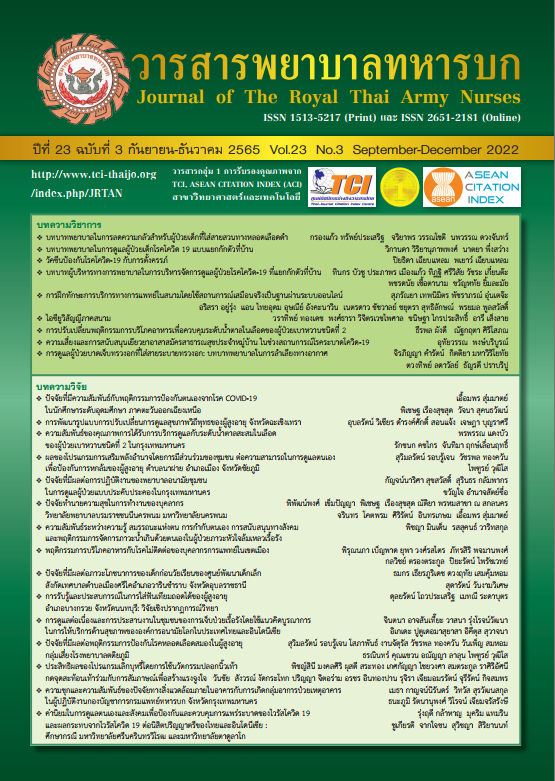Effects of Nutrition Education Program with Applied Social Support Theory on Food Knowledge and Consumption Behavior among In-patients with Acute Coronary Syndrome of Naresuan University Hospital
Keywords:
Nutrition education program, Social support theory, Food consumption behavior, Patient, Acute Coronary SyndromeAbstract
The objectives of this research were to study the level of social support, compare food knowledge and compare consumption behavior of in-patient with Acute Coronary Syndrome of Naresuan University Hospital before and after the implementation of nutrition education program with applied social support theory. The participants were 78 in-patients of Naresuan University Hospital diagnosed with acute coronary syndrome obtained using purposive sampling. Tools used in this research were questionnaires and nutrition education program with applied social support theory. Descriptive statistics and t- test were used for data analysis. The results revealed that level of social support for both groups before treatment were low with no significant. After treatment, there was moderate social support for the control group ( = 2.51, S.D. = 0.81) and high social support for the treatment group (
= 3.69, S.D.=0.62). The level of food knowledge in the treatment group to the high level (
= 14.66, S.D. = 2.19) and was statistically significantly higher than the control group (p<.05). Lastly, food consumption behavior of both groups before treatment was ranked as moderate, but after treatment, consumption behavior of both groups was ranked as good (
= 3.67, S.D.= 0.21 and
= 3.84, S.D.=0.23) with the treatment group having a significantly higher overall score than the control group (p<.05). A nutrition education program with applied social support theory could help patients improve their health behaviors. For a better outcome, organizing education activities and counseling should concern each patient’s context.
Downloads
References
World Health Organization. Global status report on noncommunicable diseases. Switzerland: WHO Press; 2014.
Nithitantiwat P. Food consumption behavior among Thai adolescents, impacts, and solutions. Journal of Phrapokklao Nursing College. 2017; 28(1) : 122-128. (in Thai).
Department of Disease Control. The office of disease prevention and control 6 Chonburi, invite to protect the heart in world heart day. Nonthaburi: Non-communicable Disease Division; 2018. (in Thai).
Department of Health. Warning for soft drinks to risk an obesity, diabetes, pressure, high blood, heart disease. Nonthaburi: Communication and Risk Response Division; 2014. (in Thai).
House, J. S. Measure and concepts of social support. Florida: Academic; 1981.
Best, J. W. Research in education (3rd ed.). New Jersey, NJ: Prentice-Hall; 1977. 7. Bloom, B. S. Handbook on formative and summative evaluation of student learning. New York: McGraw–Hill; 1971.
Ministry of Public Health. Food consumption behavioral modification. Nonthaburi: Health Education Division; 2015. (in Thai).
Worla-or S, Malatham P, Siripitayakunkit A. Family support perceived by older persons with controlled type 2 diabetes. Ramathibodi Nursing Journal. 2015; 18(3) : 372 -388. (in Thai).
Rungrojwattana W, Kompayak J, Punthasee P. The effects of self-efficacy and family support promotion program on overweight among junior high School students. Journal of The Royal Thai Army Nurses. 2019; 20: 274 - 284 (in Thai)
Konyanee S,Tassanaiem S. The effect of the application of food, exercise, emotion, non-Smoking, alcohol cessation and social support to reduce the risk of diabetes and hypertension among new risk groups. Ratchaphruek Journal. 2019; 17(2): 95-104. (in Thai)
Wichitthongchai C, Lowirakorn S. Effect of nutritional education in patients after coronary artery bypass graft surgery at Queen Sirikit Heart Center of the Northeast, faculty of medicine, Khonkaen University. Srinagarind Med J. 2013; 28(2): 220-228. (in Thai).
Supachaipanichpong P, Attasopon L, Chumchuen P. Effectiveness of social support to change health behavior in glycemic control for diabetic patients type II in Phaengphuai sup-district, Damnoensaduak District, Ratchaburi Province. Mahasarakham Hospital Journal. 2016; 13(2): 36-46. (in Thai).
Patcharaporn A, Anonng A, Malee U. Effectiveness of tutorial teaching through computer assisted instruction regarding to dietary control for ischemic heart disease prevention on food consumption behaviors in high risk patients. Nursing Journal. 2015; 42 (Suppl): 193-204. (in Thai).
Semaphet J, Senaruk W. Effects of social support program on self-care behaviors of acute coronary syndrome patients. Journal of Nursing and Health Care. 2014; 32(2): 131-140. (in Thai).
Hudthagosol C, Luangjinda C, Tantixalerm C. Healthy Thai rice recipes and menus development for Thai eldery: The Hong Kong Polytechnic University; 2018. (in Thai).
Ruaisungnoen W, Saensom D, Methakanjanasak N, Daenseekaew S, Chaiyapoom N, khanthamoon R, et al. High sodium consumption situation and perception relevant to high sodium consumption associated with chronic kidney disease among people with chronic non-communicable disease. Journal of Nursing and Health Care. 2018; 36(3): 242-250. (in Thai).
Sayruamyat S. Consumer behaviour for rice and factors determining its price in Bangkok: A case study of riceberry rice. Bangkok: Thailand Science Research and Innovation; 2019. (in Thai).
Maltz, M. 21-Day Habit Theory. New Jersey, NJ: Prentice-Hall: 2016.
Downloads
Published
How to Cite
Issue
Section
License
Copyright (c) 2023 Journal of The Royal Thai Army Nurses

This work is licensed under a Creative Commons Attribution-NonCommercial-NoDerivatives 4.0 International License.
บทความหรือข้อคิดเห็นใดใดที่ปรากฏในวารสารพยาบาลทหารบกเป็นวรรณกรรมของผู้เขียน ซึ่งบรรณาธิการหรือสมาคมพยาบาลทหารบก ไม่จำเป็นต้องเห็นด้วย
บทความที่ได้รับการตีพิมพ์เป็นลิขสิทธิ์ของวารสารพยาบาลทหารบก
The ideas and opinions expressed in the Journal of The Royal Thai Army Nurses are those of the authors and not necessarily those
of the editor or Royal Thai Army Nurses Association.






